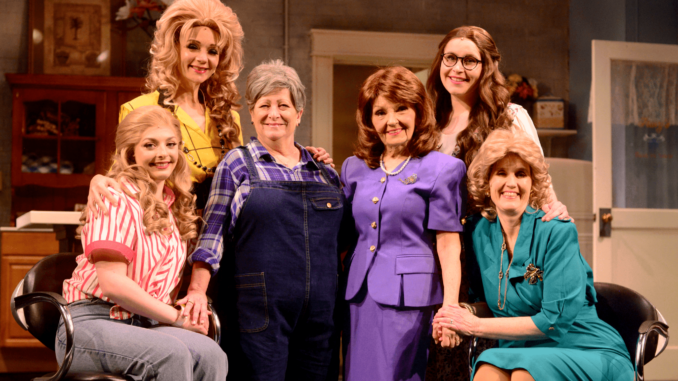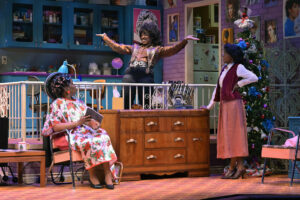
Stage III Theatre to do version of ‘Steel Magnolias’
hrough laughter, tears, and a thick fog of hairspray, these women face trials and triumphs armed with their greatest strength: each other,” a synopsis of Robert Harling’s 1989 play “Steel Magnolias” reads on playbill.com.
The cast of “Steel Magnolias” at Stage III Theatre in Casper would agree with that synopsis. By all accounts, several cast members said, it’s a story about women, but more largely a story about the power of friendship and the bonds that carry us through life.
The play takes place in northwestern Louisiana, detailing the lives of six tender, intuitive, smart-mouthed women as they navigate love, life and 1980s hairstyles. The friendships are intergenerational; the dialogue is sharp, witty and frank; the hair is poofy.
Gale Alexander, who plays Clairee Belcher, spends her winters in Louisiana and her summers in Casper. Her Southern accent is just as real as her character’s.
“It’s natural,” Alexander said. “I didn’t have to make this one up.”
The show, which Harling wrote after his sister, Susan, died of complications from diabetes, is chock full of quips about Southern culture: cutting the sweetness of fruity desserts with ice cream, pink-themed weddings, the sly and often multilayered humor of the South.
Even as north as Casper, and maybe even more because of it, the Southern sensibility rings true.

Alexander has been here long enough to have been in the first version of “Steel Magnolias” ever done in Wyoming at Casper College in 1991. Now, 32 years later, she’s back at the encouragement of her husband. Alexander, who is 79 and retired, does not consider acting a serious hobby.
Wearing black-and-white polka dot platform sandals and a black-and-white blouse, she is not done yet. The story, for her, has staying power.
“I don’t think I’ve seen a play that was such an ensemble. There is no star in this show. And the chemistry between these six women is just palpable, and the audience picks up on that,” she said. “Sometimes men think, ‘Oh, is this a women show?’ You’re gonna come to see this show, and you’re going to be amazed at how much you relate to it. It’s a story about families and friendship, and how you get through rough times with your friends and family. … Gender has nothing to do with that.”
Mary McPherson plays Shelby Eatenton and joined because of her own family. She and her mom love the movie.
“My mom and I watch a lot of movies together, and ‘Steel Magnolias’ is one that’s just always been something that we enjoy together. And so when Stage III chose this play, it was just so heartwarming. And so I was very excited to be cast and be able to bring something that I know will cause my family joy.”

Buffie LaRocca, who is directing this iteration of “Steel Magnolias,” has a similar story to Alexander’s: she recently moved to Casper from New Orleans. Though she spent many years in Montana, her time in the South was formative to her in numerous ways, and the play is more special because of it.
“When you move somewhere, you always lose kind of your own tribe of women. And so I’ve really found a tribe with these women,” she told the Star-Tribune. “And that’s what this show is about. Not letting go of your tribe … .”
On the show being so female-centric, she said: “The industry, along with a lot of local theaters, is very heavy on female volunteers and female actors. And so it’s really nice to have something that has six super strong parts that are all so diverse in age and background and all of that. So, for me, it’s really cool.”
Another cool thing, Alexander said, is that despite her not knowing many of the other actresses, they are now great friends.
“There is just really something – I was gonna say magical – but it’s more mystical about this play. It just generates closeness.”
She thinks they will stay friends after the show, too.
The play is an entirely female cast – no male actors – and set in one specific place: Truvy’s Beauty Salon in Chinquapin, Louisiana. The theater had to find beauty salon equipment — the chairs, the sinks, the obligatory waiting area couch and magazines. To do that, LaRocca went and knocked on a woman’s door, a Casperite who had owned a beauty salon in the 1980s and still had the era-specific items. As a result, there’s stuff from the ‘80s, but also from the ‘60s and ‘70s, which would be accurate as the play is set in the mid-1980s, and not all of Truvy’s equipment would have been new.
Rocky Mountain Academy of Hair, Skin and Nails also donated some pieces.
“It’s a combination of people from this community displaying how we love this story,” LaRocca said.
Casper may be miles away from Louisiana, but there are some similarities: a gentler pace of life compared to large cities. A sense of community. A desire to make a life here, whether you’re from Wyoming or not.
Or, as LaRocca put it: “It’s slow, it’s sweet. Like people live there and stay there. And if they leave, they come back kind-of-
